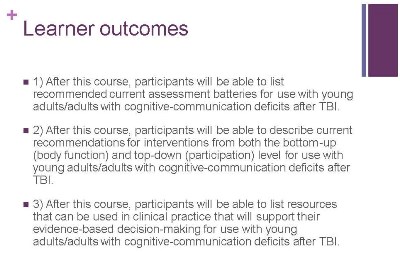Communication access real-time translation (cart) is provided in order to facilitate communication accessibility and may not be totally verbatim. The consumer should check with the moderator for any clarifications of the material.
This text-based course is a written transcript of the live seminar, “TBI: An Update on Assessment and Treatment” presented by Dr. Angela Ciccia, Ph.D., CCC-SLP.
>> Amy Natho: I would like to welcome you to our SpeechPathology.com e‑learning expert seminar entitled, “TBI: An Update on Assessment and Treatment.” My name is Amy Natho and I'll be your moderator today for this online course. It is my pleasure to introduce Dr. Angela Hein Ciccia. Angela Hein Ciccia, Ph.D., CCP, SLP is an Assistant Professor in the Communication Sciences Program, Department of Psychological Sciences at Case Western Reserve University. Her research focuses on the areas of social information processing or social cognition in the school age and adolescent TBI population. Clinically, Dr. Ciccia sees patients across the lifespan. Welcome, Angela, we are very pleased to have you here today.
>> Dr. Ciccia: Thank you for joining us this afternoon and thank you for that introduction. What I would like to do first is just get an idea of who we have in the audience today. First if you could let me know how many of you are currently seeing patients with TBI? Okay. For those of you who are seeing patients with TBI, how many of you see patients in acute care? Okay, a couple of you. How many people are seeing patients with TBI in an outpatient; more chronic setting? Okay. That gives me a nice idea. So there is a little less than half of us today that see TBI on a regular basis and that is helpful for me in terms of how much detail to give.
What we're going to do today is just give an update on what have been the most recent recommendations from a variety of organizations that have been working on making best practice recommendations in the area of traumatic brain injury. One of the reasons this has become particularly important is because of difficulty with reimbursement for cognitive-linguistic rehabilitation. Some publications in more medically-based journals indicate that cognitive rehabilitation for those with traumatic brain injury is not effective. This has elicited from a large number of organizations, such as ASHA and the Academy of Neurogenic Communication Disorders (ANCDS) and the ACRM (the Academy of Rehabilitation Medicine), to have groups of individuals, panels, committees and working groups come together to justify what we do for our patients with traumatic brain injury and provide some solid framework and recommendations for what should be addressed and how to do it.
Below are the learning outcomes for today’s seminar and we will cover all of these within the course:


